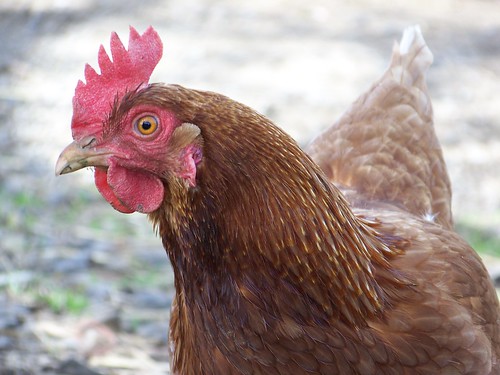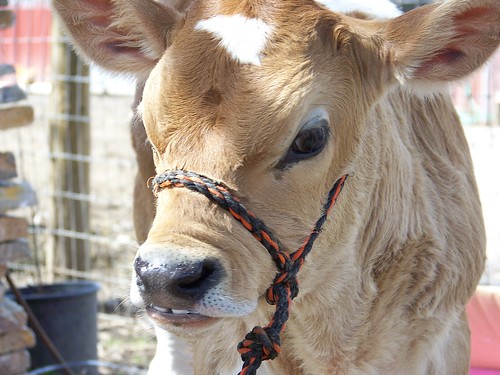Kookoolan Farm is a small, pastured based farm in Yamhill, OR about an hour outside of Portland. Chrissie and Koorosh, the farmers, keep three Jersey cows for raw dairy, chickens for eggs and meat and have a licensed poultry processing facility there. They also partner with what i
 s becoming a co-op of farmers to get humanely raised, grass fed meat to paying customers in the Portland area. They are a really amazing, real food farm.
s becoming a co-op of farmers to get humanely raised, grass fed meat to paying customers in the Portland area. They are a really amazing, real food farm.The first thing my students noticed was the 3 week old calf tethered in the front yard. He was born on the farm and was tethered out so visitors could pet him to gentle him. One thing I found really interesting was Chrissie's comments on her Jerseys being, em, insistent mothers. As a dog person this makes perfect sense. When we breed a strain of animals to do one thing we get a fair amount of "logical conclusion" behavior. For example, Labradors have been bred to retrieve and many labs have weird mouthy/eating/carrying things around behavior. Jack Russell terriers were bred to chase rats so we see obsessive chasing and visual stimulation behaviors. Well, apparently when we breed cows to do nothing but be pregnant or nursing we get some "logical conclusions" behaviors around mothering. Chrissie says one of her cows gave birth and the other two were mothering the one calf so aggressively that she had to buy two more calves from other local farmers. This is one of her teddy bear calves. He is 5 days old and he sucked on my thumb. Soooo cute!! Baby cows are pretty much adorable.
Next we got to tour the chicken houses. Kookoolan has had up to 500 chickens at a time, though
 this year they are running a slightly smaller operation. The hens are free range and roost and next in one of two large sheds with some feed along with the next boxes. She noted the symbiotic relationship between the chickens and the cows. They feed a little bit of whole wheat to the cows that they don't digest, but entices the chickens to scratch through the manure. For as many animals as there were in her small yard, there really was very little animal smell.
this year they are running a slightly smaller operation. The hens are free range and roost and next in one of two large sheds with some feed along with the next boxes. She noted the symbiotic relationship between the chickens and the cows. They feed a little bit of whole wheat to the cows that they don't digest, but entices the chickens to scratch through the manure. For as many animals as there were in her small yard, there really was very little animal smell.It was fun to see the different personalities of the different chickens. Some came right up to use to see if we had anything for us while others scattered as we came near. Chrissie is raising another 100 chicks in a brooder with the hopes of having them come into egg laying around Christmas, when her current layers will be on their winter break. This will provide her with a steady supply of eggs through the holiday season, when we humans like to eat eggs in things like pumpkin pie.
We also got to see the milking house and talk a little bit about raw milk production. In Oregon it is legal to sell raw milk on the farm if you keep only a small number of animals and don't advertise. The kids noted some chickens drinking some milk out of a pan on t
 he ground and this led Chrissie to tell us about their testing procedures for the milk. They use the standard milk test of a somatic cell count to determine cleanliness of the milk. This count detects white blood cells in the milk which indicate an immune response in the animal. In Washington and California, where raw milk is legal and licensed by the state, somatic cell counts must be below 10,000 cells per mL, and commercial dairies that pasteurize their milk have an average somatic cell count of around 300,000 cells per mL! At Kookoolan farm if somatic cell counts are any more than a few hundred cells per mL the milk goes to the chickens. That morning Glitter, one of their milk cows was dealing with a cut on her leg which caused her cell count to be higher. The milk was probably perfectly safe for human consumption but like most small farmers Chrissie's product is either perfect, or not good enough.
he ground and this led Chrissie to tell us about their testing procedures for the milk. They use the standard milk test of a somatic cell count to determine cleanliness of the milk. This count detects white blood cells in the milk which indicate an immune response in the animal. In Washington and California, where raw milk is legal and licensed by the state, somatic cell counts must be below 10,000 cells per mL, and commercial dairies that pasteurize their milk have an average somatic cell count of around 300,000 cells per mL! At Kookoolan farm if somatic cell counts are any more than a few hundred cells per mL the milk goes to the chickens. That morning Glitter, one of their milk cows was dealing with a cut on her leg which caused her cell count to be higher. The milk was probably perfectly safe for human consumption but like most small farmers Chrissie's product is either perfect, or not good enough.Another thing that so impressed me about Chrissie and Koorosh is the partnerships they've been able to form with other farmers in their area. They are raising beef with their immediate neighbor who is now 70 years old and doesn't want to work as hard as he used to. He raises the calves on his land and Chrissie and Koorosh market the meat to real-food aficionados in Portland who will pay top dollar. They've formed a similar partnership with a neighbor across the highway who raises lamb. For years he was driving to Woodburn to sell his gr
 assfed lamb for 85 cents per pound on the hoof. By partnering with Kookoolan Farm and tapping into the premium meat demand they are now commanding a considerably higher price, and actually making money on their lambs. Yet another farmer raises pheasants and turkey, and others allows Chrissie's meat chickens to be raised in their orchards and vineyards.
assfed lamb for 85 cents per pound on the hoof. By partnering with Kookoolan Farm and tapping into the premium meat demand they are now commanding a considerably higher price, and actually making money on their lambs. Yet another farmer raises pheasants and turkey, and others allows Chrissie's meat chickens to be raised in their orchards and vineyards.The most amazing part of all of this is that Chrissie and Koorosh have only been doing this since the fall of 2005!! Chrissie says she never even had a pet before they bought their first batch of day old chicks. They had never milked cows or butchered chickens. They were managers at Intel and are simply willing to take the risks required to start a farm. Chrissie says she works harder now than she did at Intel, but is happier and healthier by a country mile.
Every kid should get to visit a farm, and every person should get to eat food produced with as much attention and care as the food produced at Kookoolan Farms. You can see more of my photos from the farm visit on my Flickr page. Also, please check out their website for more information on their practices, their cheesemaking classes and their offerings. And then find a farm like them near you to get your own real food.
What a fun tour! I new factory dairies had bad milk, but didn't realize the somatic cell count was so high. I'v been telling people that pasteurization is just an excuse to sell filthy milk from sick cows and this is yet one more piece of evidence :)
ReplyDeleteWe need more farms like this one!